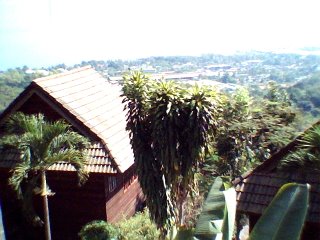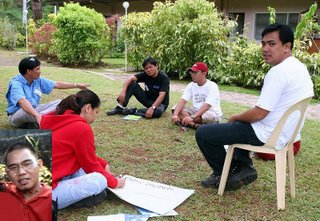
TOURISM VILLAGE. The Eco-Tourism Village, also known as “The Gardens of Malasag,” in Malasag , Cugman, a 20-minute drive from downtown Cagayan de Oro, has chosen as venue by an international network of journalists for a training program that would be participated in by at least 35 media practitioners from all over northern Mindanao from Nov. 17 to Nov. 20. Photo shows the view of Macabalan Bay from the hills of Malasag. (Photo by BEN BALCE)

PECOJON'S TRAINING AT EDEN. Photo shows Mindanaoan journalists including Cagayan de Oro Journal editor Ben Balce (wearing cap, 2nd from right) working on a group exercise held at Eden Natural Park in Davao City on May 13-15, 2006. The scheduled seminars in Cagayan de Oro City (Nov 17-20) would be the third time this year. Balce (inset photo) is Cagayan de Oro-based correspondent writing in Malaya, The National Newspaper and Mindanao Gold Star Daily.
CAGAYAN de Oro City ( BEN BALCE / Nov. 15) - A training on Peace and Conflict Journalism Network (PECOJON) seminar will be held at the Malasag Eco Tourism Village in Cagayan de Oro from Friday to Monday (Nov. 17 – 20).
The tourism village is situated in Sitio Malasag, Cugman here and would accommodate at least 35 media practitioners from the cities of Iligan, Cagayan de Oro and Bukidnon.
In cooperation with InWent, PECOJON an international network of journalists, chose Malasag for its featured rows of cozy guest cottages, camp ground, picnic shed, native restaurant including multi purpose hall that fits during seminars especially in group trainings.
“Malasag is not far from the participants who are mostly from Cagayan de Oro City,” said Pecojon’s organizer Ledrolen Manriquez.
“Pecojon’s trainings on conflict reporting for journalists in war and crisis regions need a peaceful place like Malasag,” Manriquez said.
The village serves as the learning center for eco-tourism in northern Mindanao. At the same time, it generates revenues and livelihood for the tribal groups.
The training program consists of two weekend courses, Peace and Conflict Reporting I and II.
“Part 1 would last from two to three days each. The participants are expected to stay full time during the seminar,” Manriquez said.
On Day 1, Manriques said the participants would analyze and discuss the actual situation they are working in and define challenges and difficulties of reporting the conflict.
The course introduces concepts of conflict analysis and conflict transformation for journalists and gives an overview on war and peace concepts.
The course discusses the role and influence of media in conflict situations and the problems of objectivity. It introduces concepts and techniques of a constructive conflict reporting.
“In this course special emphasis is given on the aspect of journalists’ security,” said Manriquez adding that media creates the “battlefield” of modern conflicts.
“The journalists’ voice decides how conflict parties are seen: as victims or perpetrators, as suffering human beings or as the incarnate evil,” said Manriquez.
The members of the Pecojon are print, radio and broadcast journalists, journalism teachers and students as well as writers and filmmakers who are committed to implement a constructive conflict reporting.
The database of the Peace and Conflict Journalism Network (PECOJON) will be introduced as a tool for improving the journalists’ capacities and access to information through networking.
A course would also focus on practical additional skills for conflict journalists. Journalists would identify needs and gaps they want to work on, and also capacities and special skills they already have and would like to share. Emphasis would be given on communication skills.
In addition, the course would look back to the first course and deepens topics of how to do constructive conflict reporting.
Included are media objectivity, people-oriented investigation, how to avoid being used for propaganda, and how to connect with peace initiatives as a rich source of information.
The resource speaker during seminar would be Antonia Koop a German journalist and filmmaker. Her company, the C./CREAT film production has produced documentaries since 1998, mainly on political and conflict issues.
As a war journalist, Koop covered conflicts in Israel and Palestine, Kenya and other countries. She studied peace journalism at the Transcend University, Romania.
Aside from her journalistic work, she holds journalism training programs particularly on peace and conflict journalism – and teaches conflict transformation in a University.
Since April 2004, Ms. Koop has lived in Bacolod City coordinating the training program for PECOJON.
Home

No comments:
Post a Comment